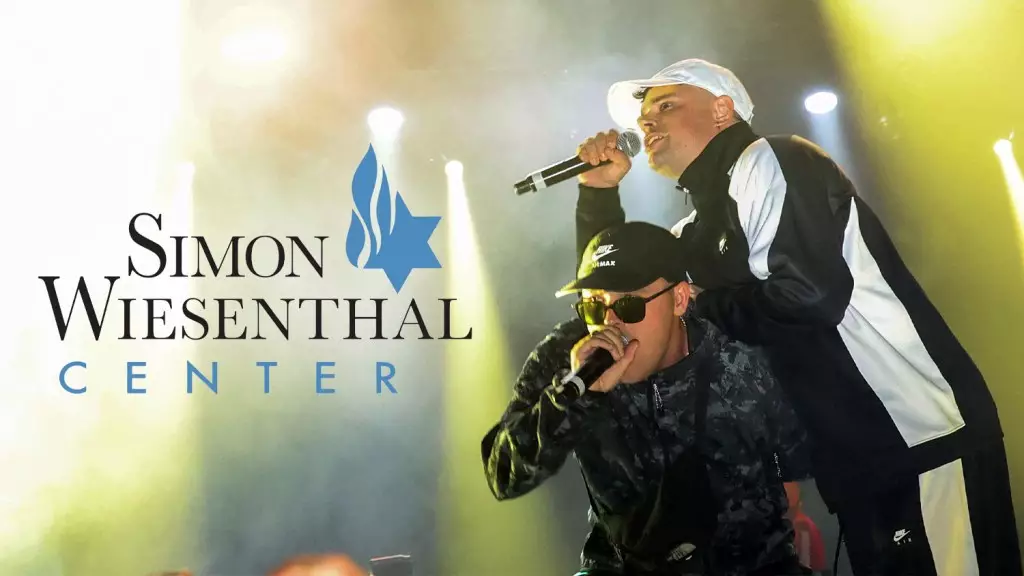In the realm of music, platforms can serve dual purposes: they can either amplify voices for change or, conversely, incite division and animosity. This dichotomy was starkly illustrated at the recent Coachella festival, where the Irish hip-hop group Kneecap unleashed a fierce critique against Israel with their slogan “F*ck Israel, Free Palestine.” While their sentiments reflect a passionately held belief in the plight of the Palestinian people, the nature of their expression raises significant questions about the role of music in promoting understanding rather than escalating conflict.
Kneecap’s choice to intertwine art with political statements is not new; many musicians have historically weighed in on social issues. However, the inflammatory nature of their remarks was met with immediate backlash, notably from the Simon Wiesenthal Center, a prominent Jewish human rights organization. This reaction underscores a critical point: when artists engage with polarizing subjects, they must navigate the delicate balance between advocacy and respect. The Wiesenthal Center, in its condemnation, emphasized that music’s inherent purpose should be to foster empathy, not to sow seeds of hatred or division. This notion stands as a cornerstone for any artist grappling with socio-political themes, as the fallout from inflammatory rhetoric can prove detrimental not only to targeted communities but also to the artists themselves.
A Misguided Approach to Compassion
For many artists, the motivation to speak out stems from genuine concern and a desire for justice. Nevertheless, Kneecap’s approach seems to miss an essential component of advocacy: the necessity of creating space for dialogue. By utilizing their stage as a forum for incendiary comments rather than nuanced discussion, they risk alienating potential allies and further entrenching divisions. The Wiesenthal Center’s call for a collaborative dialogue epitomizes how art can be a vehicle for reconciliation instead of aggression. Engaging in discourse can lead to a deeper understanding of the complexities inherent in long-standing conflicts.
Kneecap’s public stance crystallizes the broader narrative of increasing polarization within global politics, where conversations around Israel and Palestine have become intensely fraught. Their fixations on military actions and governmental policies may resonate with many, yet it is vital to recognize that their language can have far-reaching consequences. The reactions from other Coachella performers, such as Green Day, who also referenced pro-Palestinian sentiments, illuminate that there is a growing movement within music to use this powerful medium as a form of activism. However, the delivery matters immensely. The ability to instigate conversation and facilitate understanding can easily be overshadowed by the use of aggressive language that many might perceive as harmful.
The Consequences of Polarizing Messages
In recent years, we have seen an alarming trend toward using public platforms to amplify fierce criticisms without context, resulting in hostility rather than constructive conversation. The rhetoric deployed by Kneecap reflects frustrations rooted in legitimate grievances; however, when expression devolves into an “us versus them” mentality, it turns a potential advocacy movement into a breeding ground for further antagonism. The historical context of this conflict, laden with pain on both sides, is too rich and complex to afford the luxury of sweeping generalizations.
What is often overlooked is the importance of historical accountability, particularly amidst deeply entrenched narratives surrounding the conflict. The mention of the tragic events that unfolded during the October 7 attack, where countless lives were lost, emphasizes that the cycle of violence feeds into the larger narrative of fear and retaliation. Moreover, the failure to address the human dignity of all parties involved can sour any efforts at constructive dialogue. This is why it is imperative for artists and advocates alike to embrace discussions that promote awareness and healing rather than perpetuating cycles of animosity.
In a world where music can catalyze change, artists have a unique opportunity—and responsibility—to exercise their platforms wisely, opting for positivity rather than provocation. The path forward lies not in glorifying battles of ideology but in unearthing the shared humanity that can bridge divides. In this rapidly changing landscape, it remains crucial to remember that the true power of music lies in unification, empathy, and understanding—a lesson that, if embraced, can pave the way for a brighter, more harmonious future.
